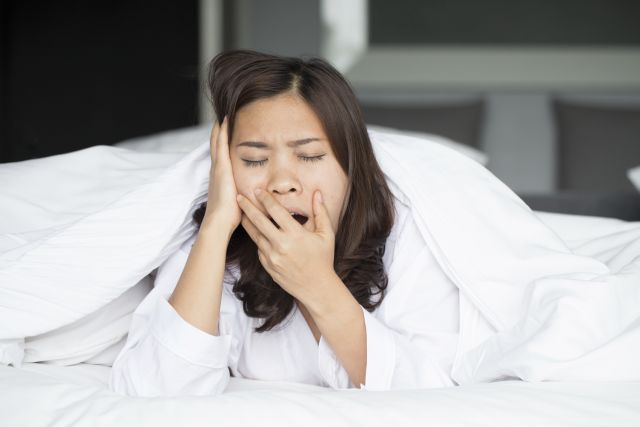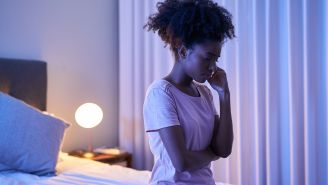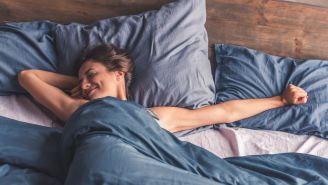The first step to better sleep is to practice good sleep hygiene: This means turning off all devices before getting into bed, eliminating light, sticking to a bedtime ritual, and limiting bedtime activities to sleep, reading, and sex. But what you eat before you turn out the lights and get under the covers—whether it's a late-night meal or a snack—also plays a significant role in your rest. Here, then, are four foods that will help get and stay asleep, along with four others that should be avoided.
DO: Eat cherries—especially tart ones
Drinking tart cherry juice before bed may help you sleep better, according to several small studies results. Sounds random, right? But as it turns out, cherries are a good source of melatonin, a hormone with an outsized role in powering sleep cycles.
DON’T: Drink caffeinated beverages
It’s obvious, but it needs to be said: Drinking caffeinated beverages close to bedtime—which includes coffee, and many sodas and teas, including green tea—sets you up for a poor night of sleep. Caffeine is a stimulant that works quickly (within minutes) to increase your alertness. According to the National Sleep Foundation, caffeine’s impact is long-lasting, too, continuing to keep you alert for several hours.
DON’T: Drink alcohol before bed
As anyone who’s propped their head up in a bar after a few too many beverages knows alcohol can have a soporific effect. But, while having a nightcap may help you fall asleep, over the course of the night, boozy beverages ultimately prevent you from reaching a deep, restful state.
DO: Eat a banana
High in magnesium, which can help ease insomnia, bananas are the perfect choice for pre-bed snacking. Don’t like bananas? Magnesium is also found in dark, leafy greens, avocados, and many nuts and seeds.
DON’T: Indulge in high-fat foods
While you’re avoiding a boozy nightcap as well, consider the merits of skipping a bowl of ice cream or other desserts with a high fat content. Some experts believe eating a fatty meal right before bedtime can stimulate acid production and cause heartburn, leading to poor sleep quality and daytime drowsiness.
DON’T: Order the chocolate dessert
We’re not saying to bypass dessert entirely, but chocolate is an under-the-radar source of caffeine. You wouldn’t chug a cup of coffee before going to bed, and in the same spirit, bedtime is not the best time to eat a brownie, down a piece of chocolate cake, or even indulge in a few squares of chocolate.
DO: Eat whole grains
Dieticians recommend complex carbs as a sleep-booster. Whole grains and wheat-based breads and pastas provide a steady release of insulin into your blood—just what you need to achieve restful sleep. Try whole-wheat pasta for dinner, or have wheat-based crackers as your bedtime snack.
DO: Have a cup of chamomile tea
The research is not entirely conclusive, but one study found modest benefits from having chamomile (as opposed to a placebo) for reduced nighttime awakenings. It’s suggested that the act of preparing and drinking herbal tea at bedtime may have a relaxing, sleep-promoting effect. File sipping a warm, cozy cup of tea under worth a try, and consider making this beverage part of your bedtime wind-down routine.
BONUS: One myth that just won't go away
Were you expecting to see turkey on this list? We've probably all experienced exhaustion after a big Thanksgiving feast, but experts say that the cause of this sleepiness comes less from the tryptophan within the turkey, and more from our over-indulgence. The theory goes that the tryptophan—an amino acid—leads to serotonin, which in turn increases your melatonin. In truth, turkey, chicken and ground beef all have similar levels of tryptophan. The most likely reason for your Thanksgiving sleepies? Overeating, which isn’t recommended as an insomnia treatment.
As well as choosing the right foods, consider the timing of your pre-bed eating. Avoid large meals close to bedtime—this can lead to heartburn, acid reflux, and insomnia. Eat smaller meals throughout the day, and then have one of the foods on our “do” list as your last meal or snack before bedtime. Making smart choices about timing and staying away from the foods on the "don't" list will help you get your best rest.






